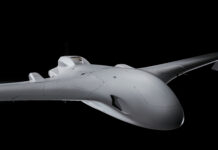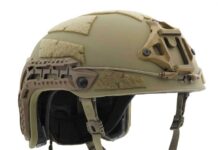Unmanned aerial system (UAS) manufacturer Aeronautics hassigned a contract with the Finnish Defense Forces (FDF) to conduct a mid-life upgrade (MLU) on their existing Orbiter 2 mini-UAS fleet, the Israeli company announced on 3 April 2023.
Under the terms of the contract Aeronautics will provide the FDF with a comprehensive MLU package that includes a full suite of sensors, avionics, and data-processing systems to enhance the systems’ performance. The contract will also involve a substantial transfer of know-how, “increasing the FDF’s level of self-sufficiency and assuring the customer of Orbiter 2 array maintenance and support capabilities for the next decade”, Aeronautics stated in a press release.
The Orbiter 2 mini UAS features a small, electrically powered unmanned aerial vehicle (UAV) with a maximum take-off weight of 13 kg, an endurance of up to three hours, a communications range of up to 50 km and a maximum speed of 50 kts (92.6 km/h). As well as an electro-optical payload with a laser pointer, the Orbiter 2 UAV can also carry various electronic warfare payloads, for electronic intelligence, communications intelligence or jamming missions.
According to Aeronautics, its main features include “innovative payloads”, advanced image processing capabilities, an advanced flight control and precision navigation system that facilitates operation in GPS-denied areas, operability in harsh weather conditions, high transportability with rapid assembly and turnaround times, and a small logistics footprint.
“We are delighted to be reenforcing our relationship with the Finnish Defense Forces through this new contract,” Matan Perry, Aeronautics’ Vice President of Marketing and Sales, was quoted as saying in a company press release. “This mid-life upgrade of the Orbiter 2 will significantly extend its lifespan, assuring the FDF high-quality, cost-efficient, tactical ISR capabilities for the next decade.”
Originally contracted to supply the Orbiter 2 UAS to the FDF in 2012, Aeronautics is understood to have supplied up to 45 Orbiter 2 systems, including up to 180 Orbiter 2 UAVs.
Peter Felstead












